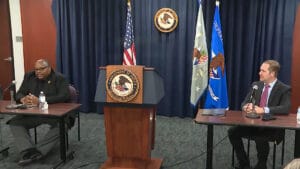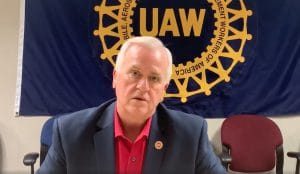
Members of the United Auto Workers could vote by September whether to amend the UAW’s constitution to allow a direct vote for top officers under the terms of a consent decree approved by a federal judge in Detroit.
The 30-page decree, issued Friday, gives the union 30 days but no more than 60 days to select a monitor and an adjudication officer to supervise the union’s internal elections and finances as well as the conduct of its officers and representatives for the next six years.
Once the monitor and the adjudication officer are in place, the union will have six months to hold the referendum on whether to amend the constitution, according to the consent decree. The monitor, with help of U.S. Depart of Labor’s Office of Labor Management Standards, will have the responsibility for preparing the language of referendum question, and setting up the rules under which it is conducted, according to the consent decree.
(Stellantis pleads guilty, agrees to $30M fine in UAW corruption probe.)
The decree also gives the monitor and the Labor Department the right to review the results and order it re-run if there are complaints about the conduct of the vote.

If the direct election system is approved by the referendum, it will be implemented shortly after the union constitution is officially amended at the UAW’s next regularly scheduled constitutional convention in June of 2022, the decree states.
No member of the current UAW executive board has come out in favor of the change to direct vote and none are expected to either since the they were all selected by the delegate system that effectively choked off open competition for top union offices for nearly 30 years. The Administration Caucus also used support for favored candidates in local union races for delegates as well as entertainment and intimidation to maintain and perpetuate its control.
Recent delegate-only elections to fill open seats on the UAW executive all have been won handily by Administration Caucus loyalists, who used the current system to brush aside any challengers.
The consent decree, however, does attempt to place some limits on the “Administration Caucus,” which has dominated the UAW’s internal politics and was in complete control during the past 10 years when federal investigators found the union was riddled with corrupt practices that severely damaged its reputation and undercut its authority and credibility.
“The parties agree that it is prohibited from using union assets or using union employees’ time for use in the internal election of any candidate for office in the UAW or its constituent entities. No monies held or deposited in union-designated accounts for charitable purposes may be used to promote the candidacy of any individual for elective office,” the decree said.

Appointed union officials were required to donate part of their salaries to so-called “Flower Funds,” which were used to bolster the power of Administration Caucus during key election campaigns.
(UAW strikes deal with Feds to remain independent.)
The decree also states the “Monitor will ensure that any contributions from any member, employee, or officer of the constituent entities in support of candidates or slates of candidates for union office are collected on a fully voluntary basis.”
The monitor also will have the authority to discipline union officers or officials who violate its rules. The order signed by Judge David Lawson also relieves the UAW of potential criminal and civil liabilities.
“The United States Attorney’s Office for the Eastern District of Michigan agrees that it will not file any criminal charges against the UAW related to any conduct related to the administration of the chargebacks for UAW employees working at a joint training center,” the order implementing the decree signed by Lawson.

For years, the union had covered the salaries of staff members assigned to so-called joint activities with money “chargebacks” from Fiat Chrysler, General Motors and Ford. The UAW maintained the chargebacks were allowed, but the U.S. attorney said they were not.
In addition, the system had been blatantly abused by union officials who charged the cost for items such as monthlong holidays at expensive resorts in Southern California.
In all, 11 union officers or officials have been convicted of federal crimes connected to the scandal, such as conspiracy, theft of union funds, mail fraud and violations of federal labor. The widow of a 12th UAW officer also pleaded guilty to federal criminal charges and three executives of Fiat Chrysler also have been convicted of violations of federal labor law for bribing union officials.
(UAW, Justice Department working on possible changes at union.)
Fiat Chrysler U.S. LLC also pleaded guilty to one count of conspiracy to violate federal labor law and agreed to pay $30 million fine.







